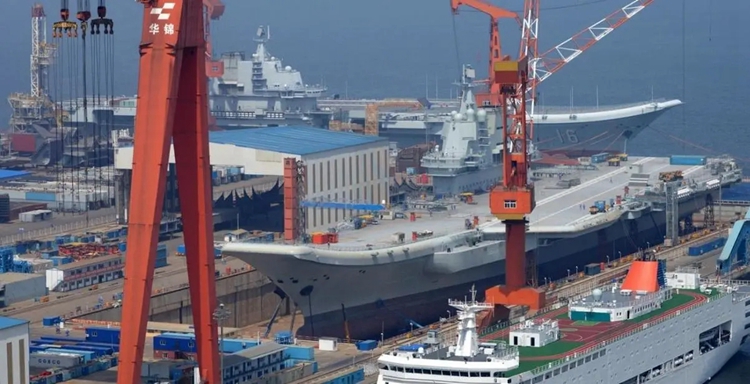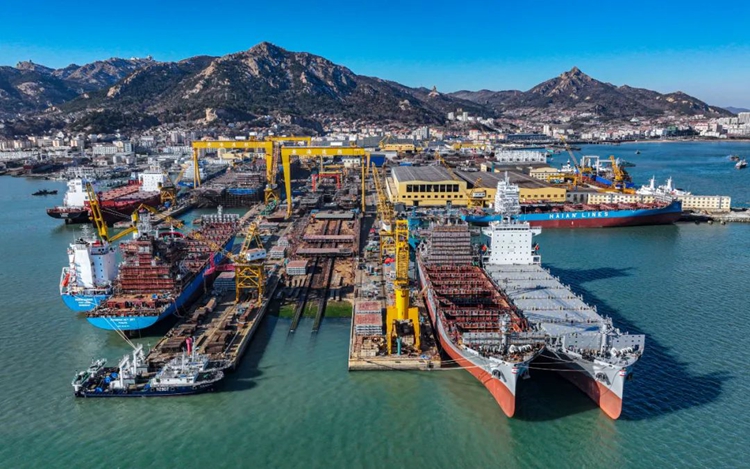Hong Kong's South China Morning Post (SCMP) published a report on February 28 titled "China's Shipbuilding 'Advantage' Helps It Thrive Under U.S. Sanctions, Study Confirms," which is compiled below:
A study confirms that Chinese shipbuilders can obtain almost all of their shipbuilding components from their home country and appear to be weathering U.S. sanctions aimed at curbing the rapid growth of the Chinese navy.
The study, commissioned by the Chinese Academy of Engineering, sheds light on the impact of sanctions imposed by the U.S. government when former President Donald Trump was in office. The Chinese Academy of Engineering is an official organization comprised of China's top engineering and technology experts, and has some influence on government decisions.
Despite the sanctions, industry data shows that China's shipbuilding industry grew at a record pace last year, with shipbuilding completions up nearly 12 percent year-on-year to 42.32 million deadweight tons, more than all other countries combined.

China's shipbuilding industry saw a 56 percent increase in new orders in 2023, many of which were for advanced ship types, such as costly ro-ro vessels that accounted for 83 percent of global new orders, according to the China Association of the Shipbuilding Industry.
A research team led by Liu Cungan, a professor at Shanghai Jiao Tong University's School of Shipbuilding, Oceanography and Construction Engineering, set out to investigate the resilience of China's marine equipment industry chain to sanctions.
The researchers said shipbuilders have access to all but a small portion of specialized equipment. Although some Chinese products still fall short in terms of maturity compared with their Western competitors, their technological level and market potential are rapidly improving, and the prices of Chinese products are attractive to customers.
The U.S. approach to strategic competition has dealt a blow to the development of China's marine equipment industry, with the maritime sector bearing the brunt of it," the researchers wrote in their paper. During Trump's presidency, China has been labeled a 'strategic competitor,' leading to the targeting (of sanctions) of a number of high-tech and military-industrial firms, posing a major challenge to the security of China's marine equipment industry chain and supply chain."
They said an accurate assessment of the current situation "is necessary for China to prepare further defense and countermeasures," as future U.S. sanctions may escalate.
Liu Cungan's team reportedly conducted rigorous discussions and surveys with industry leaders to map out a roadmap for the development of key areas of China's shipbuilding industry.
According to the China Association of the Shipbuilding Industry, China's shipbuilding order book totals 140 million tons, equivalent to the displacement of more than 1,000 Ford-class aircraft carriers, which will be completed within the next three years.

China's shipbuilding speed is more than 200 times that of the United States. The U.S. Navy has warned that if the gap persists or widens, it will be difficult for the Western fleet to maintain its dominance of the world's oceans.
Liu Cungan and his team confirmed that shipbuilding capability is crucial to the growth of China's defense capabilities, and that its rapid growth in the face of the Western embargo is due to China's technological advances and complete industrial chain.
The study suggests that before the US asks its allies to join in further sanctions against China, China should formulate countermeasures in advance to "break the international (especially European) monopoly on the supporting industries."
For much of its history, China was a global leader in navigational technology and was the first country to use rudders. in the 15th century, the Chinese navigator Zheng He sailed with a fleet of more than 300 treasured ships, almost all of which were more than 100 meters in length.
Some Chinese marine scientists and engineers believe that China will soon regain its dominant position in shipbuilding. Currently, more than 90 percent of the world's shipbuilding capacity is located in Asia.

